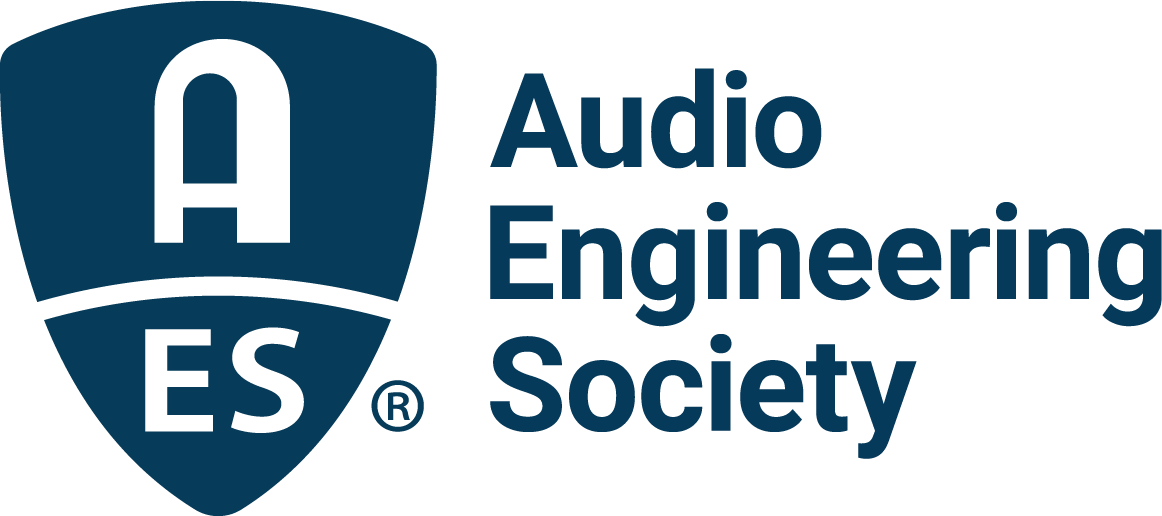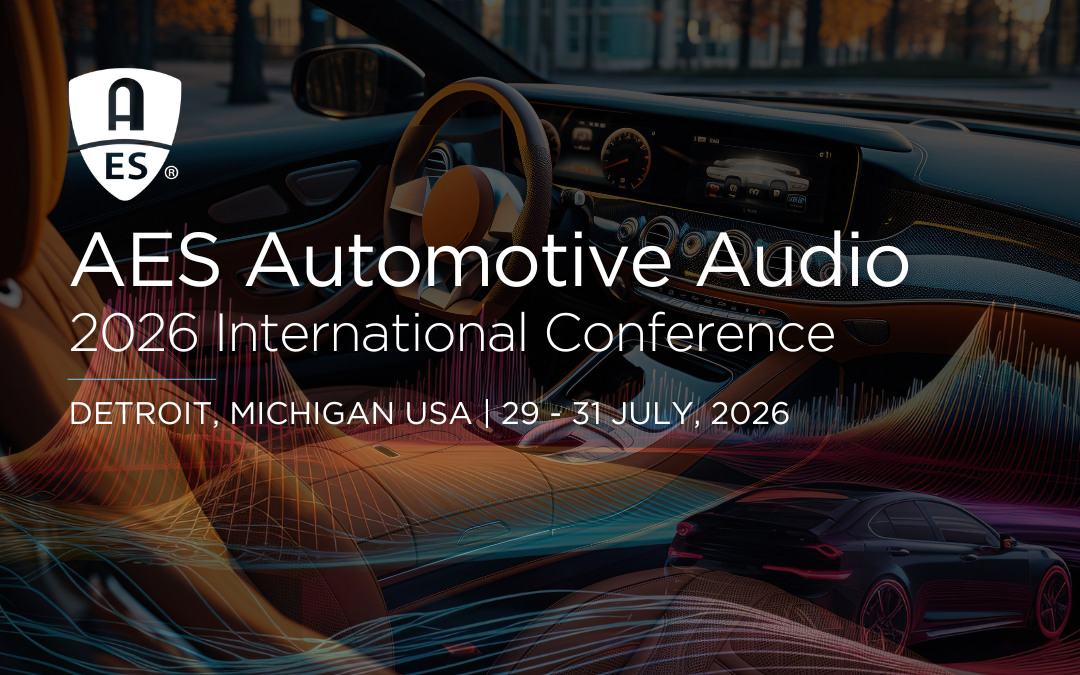Automotive Audio 2026 CFP
As an integral part in the vehicle, the role of Automotive Audio has evolved dramatically over the last several decades – from a standard mono sound in one full-range loudspeaker to a true multichannel playback system fully integrated and adjusted to the specific car, from a “box” with loudspeakers to a mobile living room with hands-free communication capabilities, and from “one-size-fits-all” scenario to personalized and interactive experience. Today some of the most advanced sound technologies, both hardware and software, are being developed and applied in Automotive Audio.
Sound systems are not only used to playback music and speech in cars, but also used to generate sounds for active sound management and to design the sound of cars (i.e. the sound of the car itself due to its motion and thus generation of sound signatures).
Furthermore, the impact of streaming, ride-share, autonomy, Battery Electric Vehicle (BEV’s), ownership models, and emerging applications of Artificial Intelligence (AI) could all have profound effects on the way we think about sound in and around vehicles and use cases.
We are very pleased to invite researchers, industry experts, and practitioners to submit papers for the AES 2026 International Conference on Automotive Audio.
This year’s conference will have a theme of “Automotive Audio in the AI Era (Sounds of future cars)”.
The conference will give an overview of the present state-of-the-art in the exciting field of automotive audio and address many of the new scientific disciplines involved in this still-emerging field, such as AI/ML, hardware and system architecture, sound reproduction and tunning, active sound management, signal processing (DSP), sound evaluation and more.
Submitting Technical Papers
Authors may submit their works in one of two categories:
Category 1: Complete-manuscript peer-reviewed Full papers
Category 2: Extended-summary-reviewed Express Papers
Complete-manuscript peer-reviewed Full Papers (Category 1)
For complete-manuscript peer-reviewed papers (Category 1), authors are asked to submit a 250 word abstract and complete paper (recommended length 6-10 pages) by EOD Tuesday, March 3, 2026. These complete-manuscript papers will be reviewed by at least two experts in the field, and authors will be notified of acceptance by Monday, April 20, 2026. Final manuscripts with the revisions requested by the reviewers are required to be uploaded by Monday, June 8, 2026.
For full papers exceeding 10 pages, if accepted, AES reserves the right to charge a fee of $25 for every page over 10.
Express Papers (Category 2)
For express papers (Category 2), authors are asked to submit an Abstract of 250 word and an Extended Summary of 500-1000 words to indicate their desire to present an express paper (recommended length 4-8 pages for the final manuscript) by EOD Tuesday, March 3, 2026. Submissions will be peer reviewed based on merit and interest to the AES community and to ensure that any presentations will not be of a commercial nature. Topics for express papers can be very wide-ranging, encompassing experimental, application-driven and/or early-stage research. Authors will be notified of acceptance by Monday, April 20, 2026. If the work based on the extended summary is accepted and the author(s) agreed to provide a manuscript, the final manuscript must be uploaded by Monday, June 8, 2026.
For express papers exceeding 8 pages, if accepted, AES reserves the right to charge a fee of $25 for every page over 8.
Downloadable Templates
Peer Reviewed (Category 1) Word Template
Peer Reviewed (Category 1) LaTeX Template
Express Paper (Category 2) Word Template
Express Paper (Category 2) LaTeX Template
Paper submission site:
Link to Peer Reviewed (Category 1)
Link to Express Paper (Category 2)
Authors may contact the Papers Committee in advance of the submission, regarding the suitability of paper topics, or for an informal review of an abstract/précis. This contact link can also be used by anyone interested in serving as a paper reviewer. We will be using blind reviews for this conference.
The conference program will include an oral presentation of accepted papers. Please note that full papers submitted under Category 1 may receive higher acceptance priority from the conference.
Submitting proposals for workshops and Tutorials
Workshops, Tutorials and Panel Discussions will complement the conference paper sessions by providing panel presentations and/or lectures led by experts in the field. These events will provide in-depth yet practical discussions related to automotive audio, while demonstrating the application of science in real-world scenarios. Those wishing to submit proposals for workshops, Tutorials and Panel Discussions shall complete the submission form in the AES AA2026 submission system for Workshops & Tutorials by Tuesday, March 3, 2026. For questions about this category of submission, please contact the conference co-chairs and/or the Papers Committee
List of Topics (but are not limited to)
- Hardware and System Architecture
- Audio system architecture and concepts
- Amplifier technologies and concepts
- Transducer technologies, applications, and concepts
- Sensors
- Microphones
- Loudspeakers
- Test/Measurement method and equipment
- Sound Reproduction in Cars
- Sound field control
- DSP algorithms (spectral/spatial)
- Computer-aided tuning methods
- Communication technologies
- Immersive 3D and spatial audio
- Virtual acoustics
- Simulations
- Auralization
- Virtual and augmented reality
- Active Sound Management and Solutions
- Active noise control system
- Active noise control (ANC)
- Road noise control (RNC)
- Engine order cancellation (EOC)
- HVAC noise control
- Acoustic vehicle alerting systems (AVAS)
- Vehicle sound design and synthesis (internal and external)
- Active noise control system
- Evaluation of Sound Quality and Speech intelligibility
- Evaluation methods
- Subjective
- Objective
- Loudness
- Distortion
- Standards
- Evaluation methods
- Machine learning and deep learning in automotive audio applications
- Automatic speech recognition (ASR)
- Voice activity detection and voice command application (interior & exterior)
- Acoustic event detection and acoustic situation awareness (e.g., Siren detection and localization)
- New Technologies for Automotive Audio
- Artificial intelligence (AI) in automotive audio
- AI-Powered Audio Personalization
- Seat-Centric Audio Zones
- Advanced Connectivity & Cloud Integration
Publication in the E-Library
Accepted papers will be included in the conference proceedings. The papers will be published in the AES E-Library no earlier than 10 days before the conference starts. All individual AES members have free access to the E-Library. For any non-member authors paying the non-member price of the registration, a year’s membership is included and will give them access to the conference papers in the E-Library .
Registration requirement
At least one author on each accepted paper (Category 1 and Category 2) must register for the conference for the paper to be included in the conference program and proceedings. All Workshop and Tutorial presenters and panelists are also required to register for the conference. Paper presenting authors, Workshop and Tutorial presenters and panelists will be given a discounted registration price (TBD by AES).
Awards
Presenting authors who are student members and whose convention papers (Category 1 or Category 2) are accepted will be eligible for the Student Paper Award at the Automotive Audio 2026 Conference. Peer-reviewed (Category 1) papers are given preference by the award judges.
Presenting authors of accepted Category 1 papers will be eligible for the Best Peer-Reviewed Paper Award.
Open Access
Authors will have the option of submitting Open Access papers. For further information see http://www.aes.org/openaccess/
Open Access
All questions about submissions should be emailed to Papers Committee

